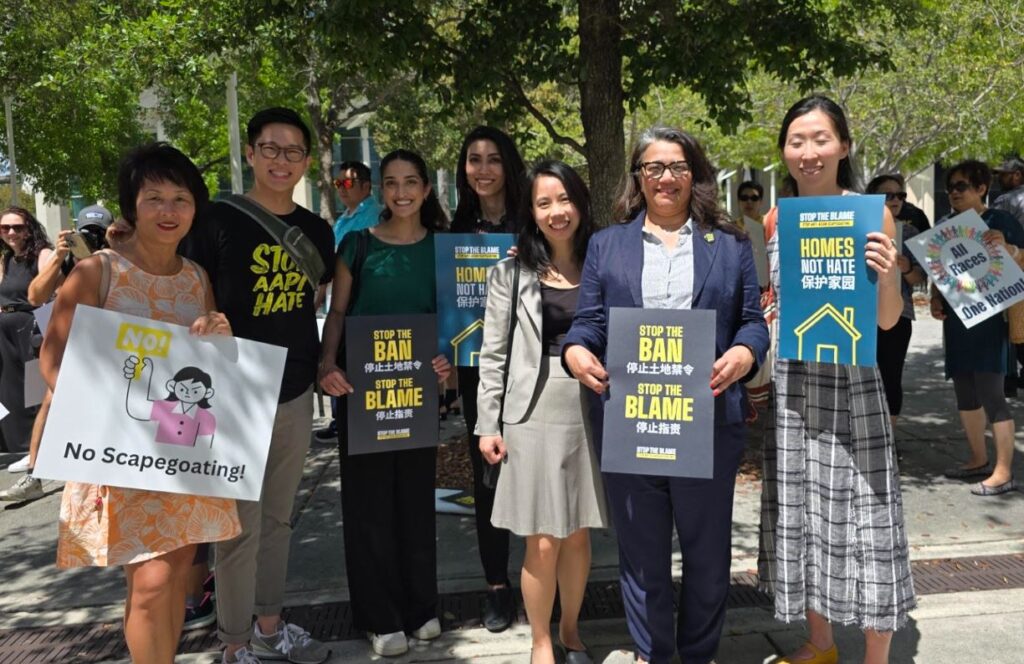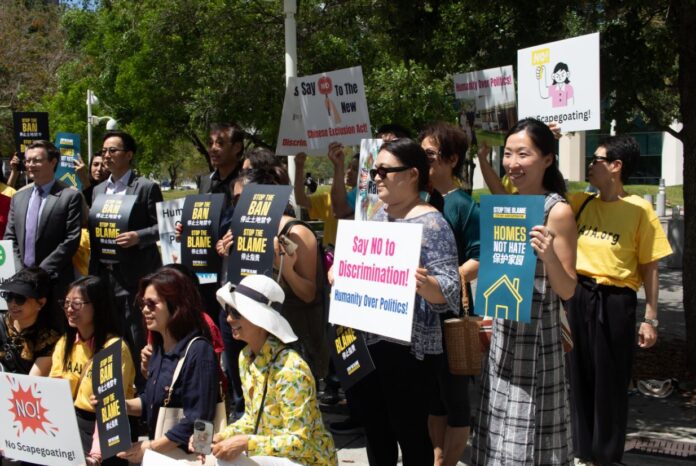By Rachel Lu, AsAmNews Intern
On Friday, lawyers representing four Chinese immigrants appeared in front of the U.S Court of Appeals for the 11th Circuit to argue that a Florida law that bans many Chinese immigrants from buying a home in a large swath of the state is unconstitutional.
Activists from all over the country showed up for a rally following the hearing. Many expressed that SB 264 has had a chilling effect for Chinese immigrants living in Florida that is rippling through the entire Asian American community.
“Many people are leaving or considering [leaving]. The people are selling houses, because we don’t know what to do, you see, not welcoming,” Echo King, co-founder and President of the Florida Asian American Justice Alliance (FAAJA), told AsAmNews. “We don’t feel welcome. So you know, people are leaving.”
The four Chinese immigrants who are plaintiffs in this lawsuit live, work, study, and raise families in Florida, but are now prohibited from buying a home there. Local real estate firm, Multi-Choice Realty, whose business has been harmed is also a plaintiff.
They are represented by The American Civil Liberties Union, ACLU of Florida, DeHeng Law Office, the Asian American Legal Defense and Education Fund (AALDEF), and the law firm Quinn Emanuel.
SB 264 was originally signed into law by Florida Governor Ron Desantis in May of 2023. While the plaintiffs say the law also unfairly discriminates against immigrants from Cuba, Venezuela, Syria, Iran, Russia, and North Korea, it singles out China with especially heavy-handed measures and harsher criminal penalties.
According to CourtHouse News, Chinese immigrants who live lawfully in the U.S as professors, students, employees, and scientists face up to five years in prison for trying to buy a home. The seller faces up to one year in prison, as well as thousands of dollars in fines.
The law’s effect on Chinese immigrants was central to the oral arguments presented by Ashley Gorski from the ACLU. She argued that the law violates the Fair Housing Act and the Equal Protection Clause by unlawfully restricting housing for Chinese immigrants.
She also argued that the law creates foreign enemies for the state of Florida, which is in conflict with the authority of the U.S government.
Previously, a lower court had denied the plaintiff’s motion based on Terrace v. Thompson, a Supreme Court case from 1924 that bars “aliens” from holding land in the State for farming and other purposes.
Gorski argued that it is particularly disturbing that SB 264 is reminiscent of discriminatory laws like the one established by Terrace from over a century ago.
“The point is these are all extremely old laws consigned to the dustbin of history long, long since repudiated,” Gorski argued in front of the court.

The counsel representing the Florida Department of Agriculture argued that this law protects national security threats not within the purview of the federal government. He argued that national security threats can arise in single family homes and urbanized areas.
After the law was enacted, Desantis’ office issued a statement to announce the law’s intent for standing up against the Chinese Communist Party.
“Florida is taking action to stand against the United States’ greatest geopolitical threat — the Chinese Communist Party,” said Governor Ron DeSantis.
King of FAAJA expressed during the rally that it is dangerous to conflate individuals with their country of birth. Bethany Li, legal director of the Asian American Legal Defense and Education Fund, AALDEF, echoed the sentiment that the law cannot be divorced from the current political climate, where both Republicans and Democrats have voiced anti-China rhetoric.
“Unfortunately, from casting China as the enemy, what we see is that the direct impact of that type of anti-China rhetoric is actually on everyday interactions for Asian Americans in the United States. It worsens the types of daily interactions that we have on streets, in schools, and the workplace, trying to get homes,” Li told AsAmNews.

In the early 20th century, similar justifications have been used to pass “alien land laws” that prohibited Chinese and Japanese immigrants from becoming landowners. Li describes this law in Florida as a “new round of alien land law.”
After the hearing, Gorski appeared at the rally to express her solidarity with the Asian American activists.
“As we all know, this country has a long and despicable history of anti-Asian hate, anti-Asian discrimination,” Gorski said at the rally. “At the same time, this country has ideals of equality, justice, and fairness. We will continue to fight to live up to those ideals.”
According to Li, the court will likely issue a decision based on the oral arguments today anywhere between a few weeks to three months’ time.
AsAmNews is published by the non-profit, Asian American Media Inc.
We are currently funded by our readers and such charitable foundations as the Robert Wood Johnson Foundation, AARP, Report for America/GroundTruth Project & Koo and Patricia Yuen of the Yuen Foundation.’
Find additional content on Bluesky, Facebook, Instagram , Tiktok, X, and YouTube. Please consider interning, joining our staff, or submitting a story, or making a tax-deductible donation.
You can make your tax-deductible donations here via credit card, debit card, Apple Pay, Google Pay, PayPal and Venmo. Stock donations and donations via DAFs are also welcomed. Contact us at info @ asamnews dot com for more info.


